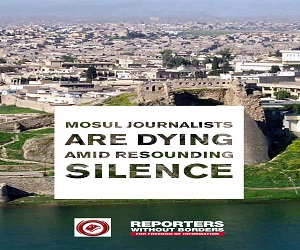The coverage of the electoral process witnessed many cases of violations to the freedom of press in Baghdad and other provinces.
In Baghdad, the reporter of al-Baghdadya channel Alaa al-Rubaii, and his assistants and cameraman were held by the Iraqi army in Zayoona neighborhood and banned- despite their getting a badge- from touring in the streets; their tools were confiscated and they were released after intensive contacts with military leaderships. In the meantime, the American army stopped some journalists and media workers in Karrada neighborhood of Baghdad; they barred the team of Beladi satellite channel from moving to cover the election, Mahmood Saeed, the reporter of the channel told Journalistic freedoms observatory (JFO) adding that the Americans threatened not to guarantee their safety in case of moving and ordered the traffic police not to allow the team leaving the place. Roaa Saad, reporter of EIN news agency suffered the same thing when the same soldiers ordered her to get off the car and to go walking some kilometers to reach the polling station.
In Fallujam west of Baghdad, Iraqi army threatened a journalist works for a foreign newspaper, preferred to be nameless, of opening fire on him when he was talking to the voters.
Member of JFO told that Falluja police leadership transported the journalists to the polling stations by the police cars adding that one army officer banned the journalists from recording the people's opinion in a central voting station.
In Mosul, journalists complained of the shortage of the permits compared to the huge numbers of journalists to cover the elections in different parts of the city.
Member of JFO in Mosul Mohammed Jafal said the journalists faced many difficulties in moving around the city because of not getting the badges; they spent the whole night in Mosul operation center in hope of getting those badges, but in vain. Due to their ignorance of the validity and importance of the badges stuck on the windshield of the journalists' cars, some army elements opened fire on them.
In Diala, east of Baghdad, journalists expressed their resentment for not having enough centers to receive the journalists. Omar al-Dulaimi, head of the unified media workers organization in Diala, said that the electoral commission provided only two centers in the province and restricted tens of journalists to enter other polling stations of the city.
In Tikrit, Marwan Naji, works for Salahuddin satellite channel, was harassed by an army officer; he was prevented with his team from entering a polling center with their equipments, JFO member said.
In Babylon province, al-Masar satellite channel reporter Sabah al-Taee was held and abused by the army for some hours and his badge was turned in to pieces.
In al-Husainiya area of Kerbala, Ammar al-Masoodi, al-Hurriya satellite channel reporter said that a security officer banned him entering the area and prevented him doing his job.
Last week, Iraq witnessed 64 violations against the journalists in Baghdad, Babylon, Basra, and Anbar; the security forces and Iraqi army harassed and confiscated the tools of the journalists while covering the electoral process of the ministries of defense and interior personnel, the patients in the hospitals, and the prisoners of less than 5 years imprisonment.
Thus, the coverage of elections in Iraq counts to be the hardest to the journalists as it registered 75 violations for the last three days; this indicates that the army is still unaware of the nature of the work of the journalists; and the high independent electoral commission is in short of protecting the freedom of press; it does not direct its officials in the polling stations to cooperate with the journalists whose work is to evaluate the integrity of the elections. JFO lays responsibility on the HIEC for the violations against the journalists and hopes it to make use of these faults in the next elections. JFO also urges the Iraqi army to practice its responsibility in fairly treating the journalists and not preventing them doing their duties.






.jpg)









